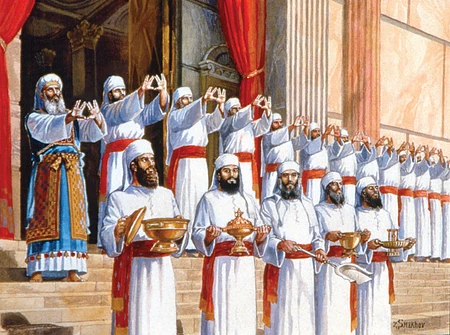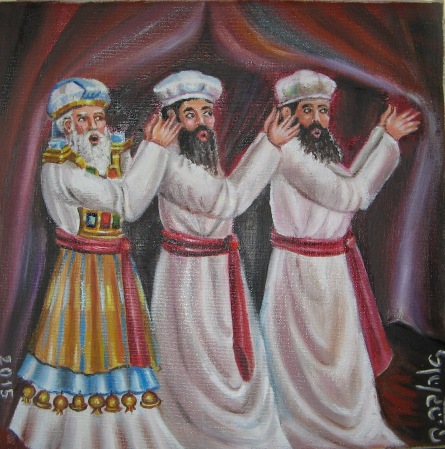[In the picture: Creating a new class: priests... The rights holder in this image has not been located. Therefore, the use is made under section 27A of the Copyright Law. The main rights holder, please contact yehezkeally@gmail.com]
[For articles on the “Sabbath of Tetsaveh" in Hebrew, click here]

Rabbi Dr. Yossi Feintuch was born in Afula and holds a Ph.D. in American history from Emory University in Atlanta. He taught American history at Ben-Gurion University.
Author of the book US Policy on Jerusalem (JCCO).
He now serves as rabbi at the Jewish Center in central Oregon. (JCCO).
* * *
This Torah portion Tetsaveh is unique if only because it is the only portion in the Torah (since we have been introduced to Moses at the beginning of Exodus) where his name per se is absent. This lacuna is traditionally linked to the rabbinical idea that the Golden Calf narrative, which will be read next week, preceded historically the divine command to Moses to oversee the making of a sanctuary for the service of God in order to avoid another such traumatic fiasco. This portion which is essentially an integral part of the sanctuary narrative is a workshop manual for the newly constituted Priestly class; the need for priestly facilitators of the Israelite ``organized religion” was most likely a derived lesson from the golden calf episode, where the people as a whole brought sacrifices and partied with abandon.
Why then is Moses’ name missing from this portion? Some commentators connect it with Moses’ insistence before God that without a full divine forgiveness of the golden calf sin, Moses would rather God wipe him out, “pray, from Your book which You have written”. Since God’s pardon of that idolatrous cardinal sin was not comprehensive, “and the Lord scourged the people for having made the calf”, when some three thousand men were put to the sword, Moses, by erasing his name from this weekly portion expressed his ill feelings and resentment about God’s directive to slay those numerous ring leaders.
And since Moses’ name is absent the portion commences with: “As for you, you shall command the Israelites…”; thus, another didactic learning opportunity is unfolding before us. The word “you” is ostensibly gratuitous, for God could have started more succinctly by simply saying to Moses: “Command…”. However, by placing ”you” before “command” we are given a message for all times; before you command others, you yourself must first do so. What good is it for political leaders to impose a lockdown and prohibit family gatherings even during a holiday in trying to curtail the spread of the virus if they themselves violate such a quarantine? Both Israel President and Prime Minister failed last Passover to comply with the official policy enforced on everyone else when they invited members of their family to their home who did not reside there daily. Leaders ought to provide an example, even when the Torah similarly commands elsewhere: “Judges and overseers you shall set for yourself within all your gates”, namely the enforcement of law and order start with “yourself”, even in your personal conduct, before it is to be applied elsewhere!






